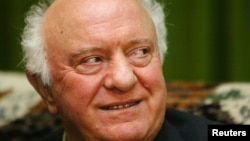Former U.S. secretary of state James Baker says former Georgian president and Soviet foreign minister Eduard Shevardnadze will be remembered as one of the true architects of a peaceful end to the Cold War.
In an exclusive interview with VOA’s Vivian Chakarian, Baker said the principal legacy of Shevardnadze, who died Monday at the age of 86, is that he, together with then-President Mikhail Gorbachev, refused to use force to keep the Soviet empire together.
Baker said Shevardnadze, a dedicated Communist, realized the Soviet system was not working to the benefit of its people and that fundamental reform was needed. Shevardnadze strongly supported Gorbachev’s “new thinking” — known as glasnost, or openness, perestroika, or restructuring — all in the face of dire warnings from Soviet hardliners.
“And you know, the hardliners in the Soviet Union at that time… were very, very tough on Shevardnadze, very tough on Gorbachev, and they resisted all of that," Baker said. "They both, in my view, showed an extraordinary amount of political courage.”
Shevardnadze is held in low regard in today's Russia because many believe that he, along with Gorbachev, brought about the end of the world’s only other superpower. Baker attributes this to the very difficult transition from an authoritarian government to democracy and free markets.
According to Baker, many people around the world today are much better off because of the non-interventionist policies the two men instituted, which ultimately led to the fall of the Berlin Wall in 1989 and the collapse of the Soviet Union two years later.
“This permitted millions of people in central and eastern Europe and in former republics of the former Soviet Union to experience freedom and opportunity and democracy and free markets — to varying extents, of course, in each republic — and I think that’s quite a legacy. And I’m quite confident that history will treat both of them very well,” Baker said.
In view of what has transpired in the last 25 years since the fall of the Soviet Union, notably the crisis in Ukraine and the rise of authoritarianism, Baker said the United States may have missed an opportunity to help bring Russia into NATO.
“I do believe that there was an opportunity maybe in 1993 or 1994… and I even wrote an op-ed to that effect in The New York Times, in which I said if Russia was to truly embrace democracy and free markets, there ought to be a place for Russia in NATO, because its character at that time was more of a political alliance rather than a security alliance," Baker said. "I regret that was not done, and I think that may be a missed opportunity.”
While Shevardnadze remained a significant figure in world politics, he was viewed as a divisive leader in his homeland, where his government became dogged by corruption and he was forced to step down as president of Georgia in 2003. Baker said this does not in any way diminish the vital role Shevardnadze played in ending the Cold War.
Baker holds his former Soviet counterpart in high regard.
“Well, we started out as adversaries, and we ended up as friends… by the time we ended that relationship, it had become one of not confrontation but cooperation."
Secretary Baker — who will lead the U.S. delegation attending Shevardnadze's funeral in Tbilisi this Sunday — said the world owes him a debt of gratitude.




